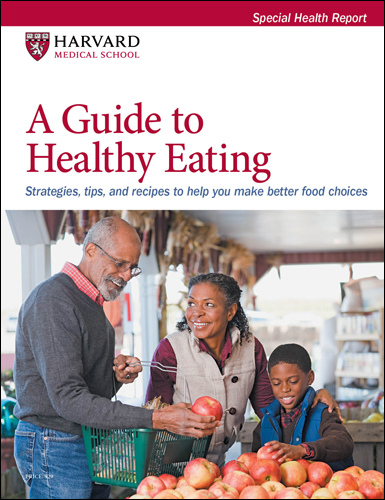The facts on fat and heart health
Dietary fat can be good or bad for the heart. Choose wisely.

No fat, low fat, good fat, bad fat. Dietary fat has had a long and often confusing reputation. Where does it fit into a healthy diet, and how does it affect your health, especially when it comes to your heart? Here are the facts about fat.
A tale of two fats
There are two types of fat: saturated and unsaturated. (A third type, trans fat, has been eliminated from food products or drastically reduced.)
Saturated is considered "bad" fat. It's mostly found in animal products like beef and pork, and dairy products such as butter, cream, and cheese. Fast foods and processed foods are other sources.
Unsaturated is the "good" healthy fat. There are two main subtypes: monounsaturated and polyunsaturated.
Monounsaturated. These fats are in avocados, peanuts, peanut butter, and nuts like almonds, hazelnuts, cashews, and pecans. High amounts are also in some oils, such as olive, peanut, safflower, sunflower, and canola oils.
Polyunsaturated. These fats include omega-6 fatty acids and omega-3 fatty acids. These are also considered essential fats because your body can't make them, and you have to get them from food. Omega-6s are in oils like soybean, corn, sesame, and peanut oils. They're also found in high amounts in walnuts, peanuts, pumpkin seeds, and flaxseeds. Omega-3s are in canola and soybean oils and fatty fish, like salmon, mackerel, herring, tuna, and trout.
The right kind
Fat plays a vital role in your health. It is a significant source of energy and helps your body absorb certain vitamins and minerals. It's a key component in every cell in your body, from building cell membranes to making insulating layers around nerves. Fat is also essential for blood clotting and muscle movement. "You need sufficient fat in your diet for optimal health," says Dr. Caroline M. Apovian, co-director for the Center for Weight Management and Wellness at Harvard-affiliated Brigham and Women's Hospital.
But you need the right kind. This is especially true when it comes to heart health. There is some debate about the extent of saturated fat's role in heart disease. Still, high amounts can drive up total cholesterol levels, including more "bad" LDL cholesterol. Too much LDL can cause atherosclerosis, a form of blood vessel disease that can lead to heart attacks and strokes. Because of this, most guidelines suggest keeping saturated fat intake to less than 10% of daily calories.
In comparison, monounsaturated fat helps lower LDL levels and manage "good" HDL levels. It also can improve the function of blood vessels. Polyunsaturated fat helps lower high blood pressure and reduce triglycerides, a type of fat in the blood that can lead to plaque buildup in the arteries. They could also lower your risk of strokes. (See "The link between fat and stroke.")
The link between fat and strokeEating more polyunsaturated fat may help prevent a stroke. Researchers recently examined 27 years of follow-up data involving 117,136 people, all of whom were free of heart disease at enrollment. They completed food frequency questionnaires every four years from which the researchers could calculate the amount, source, and types of fat in their diets. The results showed that people who ate the most polyunsaturated fat were 12% less likely to experience a stroke compared with those who ate the least. One surprising finding: eating products with dairy fat — such as cheese, butter, milk, and cream — was not linked to a higher risk of stroke. The results were presented at the American Heart Association's 2021 Scientific Sessions. |
Less and more
The best way to manage dietary fat is to take a two-step approach: cut back on saturated fat and eat more polyunsaturated and monounsaturated fats. Still, you need to be careful about how much good fat you consume. Foods like avocados, plant oils, and nuts are considered energy-dense, meaning they pack a lot of calories in a small serving. "It can be easy to consume too many calories if you are not careful," says Dr. Apovian.
One solution is to follow a DASH diet or a Mediterranean style diet. These emphasize mono- and polyunsaturated fats with less risk of overeating. Another approach is to include small amounts of good fat to everyday meals. For instance, instead of using butter whenever you bake or saut', substitute olive oil, peanut oil, or corn oil. Drizzle these oils on salads and sides in place of salad dressing, butter, or sour cream. Replace red meat with fish, spread avocado or nut butter on toast, and use palm-size servings of nuts and seeds for snacks.
"The key to getting the right fats is to focus on whole foods," says Dr. Apovian. "Most of the fat in your diet should come from what you added yourself, not from what was added in processing."
Image: © AlexPro9500/Getty Images
About the Author

Matthew Solan, Executive Editor, Harvard Men's Health Watch
Disclaimer:
As a service to our readers, Harvard Health Publishing provides access to our library of archived content. Please note the date of last review or update on all articles.
No content on this site, regardless of date, should ever be used as a substitute for direct medical advice from your doctor or other qualified clinician.
















